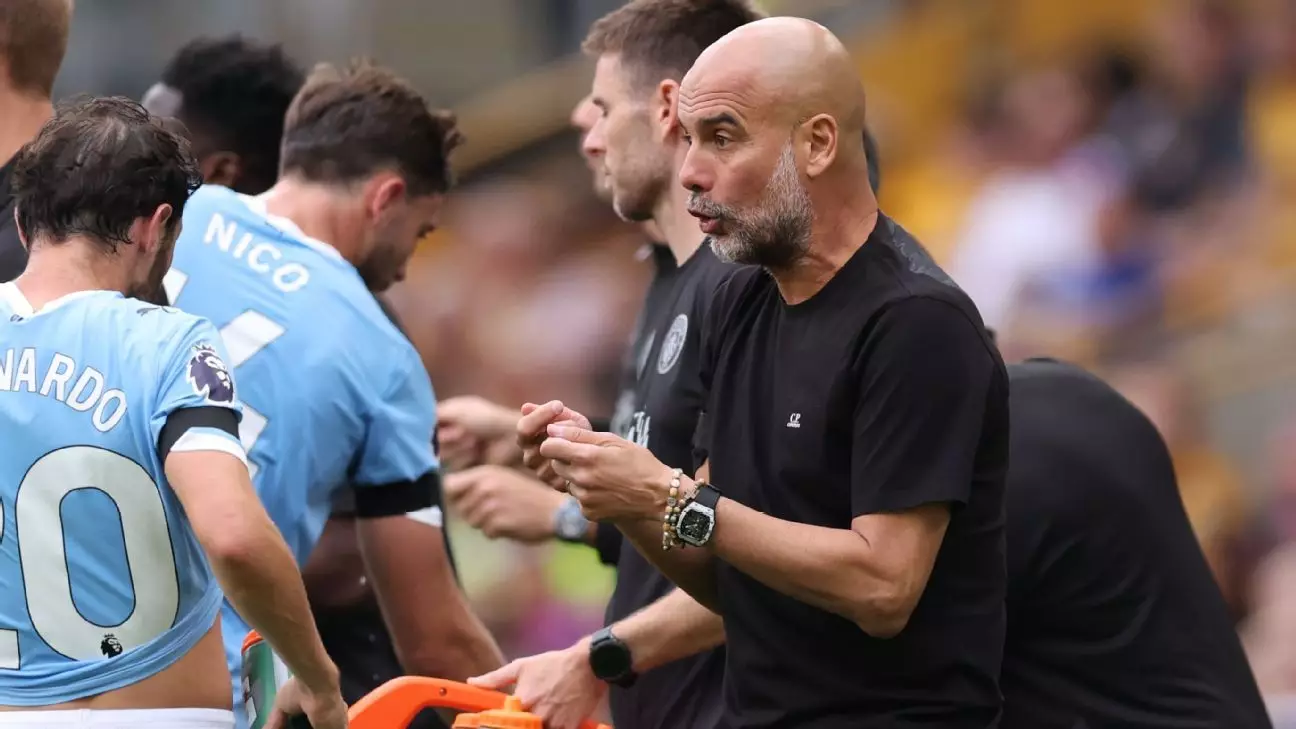In today’s football landscape, success hinges not only on talent but also on the delicate balance within a squad. Manchester City’s recent resounding 4-0 victory at Wolves illustrated the club’s attacking prowess and tactical brilliance. Yet, manager Pep Guardiola’s candid admission—that having an excessively large squad hampers team harmony—serves as a profound lesson. Over the years, football has increasingly become a game of quality, cohesion, and mental clarity rather than sheer depth.
A bloated squad breeds complacency and breeds an atmosphere where players might feel disconnected from the main goal. When too many individuals are vying for limited game time, morale can suffer, and the collective spirit diminishes. Guardiola’s stance highlights a fundamental truth: optimal performance emerges from a well-curated team where each member understands their role and feels genuinely valued. Success isn’t about having the most players but about ensuring each one contributes meaningfully and with clarity.
His comments also reflect a broader organizational challenge—how to manage player ambitions, external interests, and the club’s strategic vision without compromising the team’s core. It’s a reminder that football clubs need to prioritize quality over quantity, cultivating a culture where every player is integrated into a cohesive unit rather than merely filling a roster spot.
Strategic Player Management: Balancing Ambitions and Stability
Guardiola’s ongoing efforts to offload players exemplify the complexities of squad management at the highest level. While new signings like Tijjani Reijnders and Rayan Cherki have made an instant impact, the underlying issue remains: what to do with surplus players? This isn’t merely administrative; it’s psychological and strategic.
The example of James Trafford’s confident debut and Rayan Aït-Nouri’s standout performance at Wolves demonstrate the importance of providing opportunities for players to shine. When players see a clear pathway to minutes and impact, it boosts overall team morale and creates a competitive environment that fosters growth. Conversely, holding onto players who no longer fit a strategic vision can impede progress and create friction.
Guardiola’s transparency—acknowledging the club’s need to negotiate and find solutions—reflects a mature understanding that stability often requires difficult decisions. It’s not enough to merely compile talent; effective management involves assessing merit, potential, and fit, then making tough choices that serve the long-term goals of the team. This strategic pruning ensures that squad members are motivated, aligned with club ambitions, and engaged in mutually beneficial pursuits.
The Role of Leadership in Shaping a Winning Culture
A decisive leader like Pep Guardiola understands that the culture within a team often determines success more than tactics or individual brilliance alone. His comments on creating positive atmospheres and avoiding “leaving players at home” imply a commitment to inclusivity and morale. The best teams foster a sense of unity, where everyone believes their contribution matters.
This leadership philosophy is especially critical in transitioning periods—such as the start of a new season. While the victory at Wolves displayed offensive firepower and tactical adaptability, Guardiola’s remarks reveal that he perceives room for growth, particularly in deepening squad cohesion and sharpening tactical discipline.
Furthermore, the ongoing speculation about key players like Ederson underscores the importance of trust and clarity in leadership. Whether it concerns extending contracts or considering transfers, transparency about intentions and decisions builds a culture of respect and loyalty. As players face uncertainties, a leader’s ability to communicate vision and rationale becomes the cornerstone of sustained success.
The Modern Football Ecosystem: Navigating Expectations and Dissatisfaction
The tumult surrounding Ederson’s potential departure, coupled with rumors linking him to clubs like Galatasaray, underscores the complex eco-system of modern football. Clubs are navigators on a tumultuous sea of external pressures—media narratives, fan expectations, financial considerations, and player ambitions.
Guardiola’s stance—that if a player desires a move, it should be on the club’s terms—embodies a pragmatic approach. It recognizes that player happiness is intertwined with performance and loyalty, but also that stability and strategic interests must take precedence. Ultimately, reinforcing the club’s authority in transfer negotiations underpins the integrity of the team’s structure.
This delicate dance requires experienced leadership, strategic patience, and a clear vision. Successful clubs aren’t just about assembling talented individuals; they are about cultivating a unified, motivated, and strategically aligned squad that can withstand external uncertainties and deliver consistent results.
—
*In essence, the modern game demands a nuanced approach—one that champions quality over quantity, values strategic clarity, and recognizes that strong leadership shapes the culture in which talent can flourish. Manchester City’s latest triumph provides a glimpse into this philosophy: while on-pitch domination is crucial, the unseen art of squad management, transparent communication, and cultural stewardship ultimately forge the path to enduring success.*


Leave a Reply